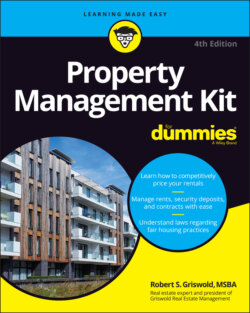Читать книгу Property Management Kit For Dummies - Robert S. Griswold - Страница 69
A seller-verified rent roll and list of all tenant security deposits
ОглавлениеA rent roll is a list of detailed information about every rental unit at the rental property, including the tenants’ names, current and market rent, any additional fees (such as for parking, pets, and storage), rent due dates, move-in dates, lease expiration dates, past-due rent, prepaid rent, rent concessions, and security deposits. Be sure that you get a written seller statement that no undisclosed verbal agreements or concessions have been made with any tenant regarding any aspect of the tenancy, including rent security deposits, unit upgrades, renewal options, payment of utilities, or any other aspects of the financial terms of the lease or rental agreement. Ensure that when interest must be paid on security deposit balances, you collect the deposits (plus all accrued interest to date) at closing.
When acquiring an occupied rental property, be sure to follow state or local laws in properly handling the tenant’s security deposit. Most state laws require the seller and/or purchaser of a rental property to advise the tenants in writing of the status of their security deposit. These laws usually give the seller the right to return the deposit to the tenant or transfer the deposit to the new owner. Here’s why you want the latter to happen:
If the seller refunds the security deposits, you have to collect them from tenants who are already in possession of the rental units. Avoid this scenario by strongly urging the seller to give you credit for the full amount of the security deposits on hand in escrow, and have each tenant agree in writing to the amount of the security deposit transferred during the sale. Close the loop by sending each tenant a letter confirming their security deposit amount.
If the seller transfers the security deposits to the buyer — rather than returning the deposits to the tenants — make sure that you receive in cash (or as a credit in escrow) an amount equal to all the security deposits held (plus all accrued interest owed to the tenants, if any). Remember that if you do get a credit in escrow, you must have available funds be able to refund the remaining balances (after taking proper and legal deductions) of any tenant security deposits when the tenants move out.
Without written proof to the contrary, dishonest tenants may later claim that they had a verbal agreement with the former owner or manager for a rent credit or discount for maintaining the grounds or doing light maintenance, or that they were promised new flooring or another significant unit upgrade. If this scenario happens to you, offer to contact the former owner or manager immediately to verify the tenant’s story. In my experience, when you offer to verify the story, the tenant typically begins to backpedal, and the truth comes out. But to avoid any surprises, obtain a written statement from each tenant indicating that no such verbal agreements exist before closing escrow.
